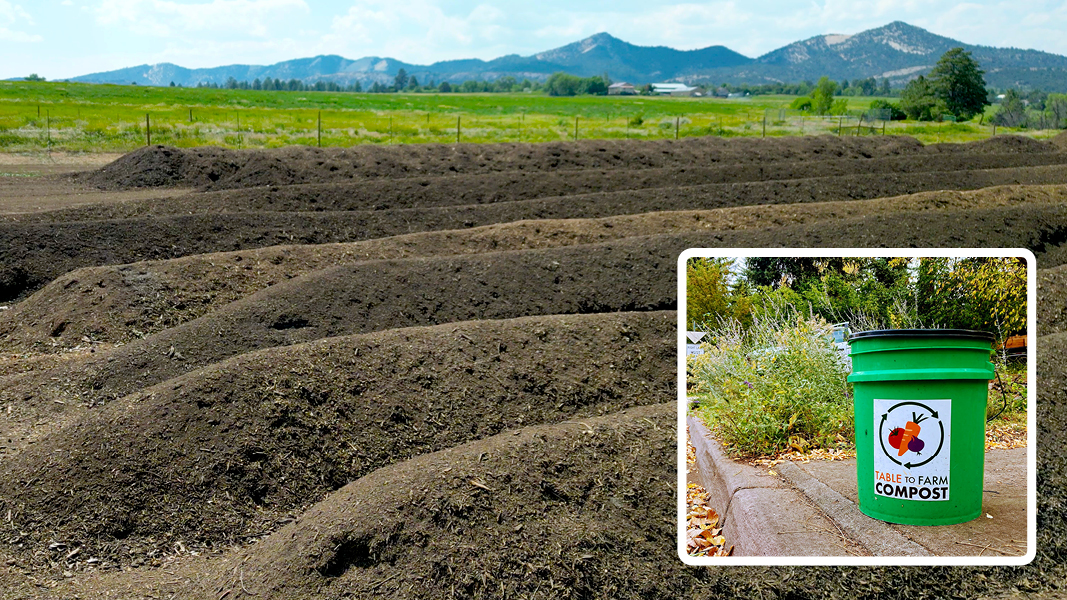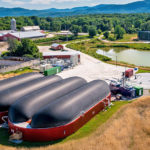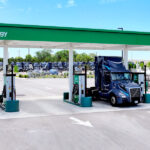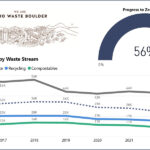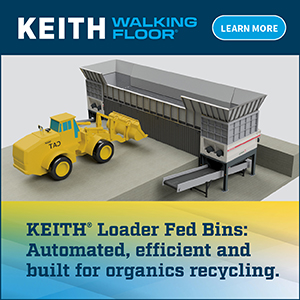Top: Table To Farm Compost in Durango, Colorado collects residential and commercial food scraps. Its windrow facility is permitted to process 18,000 cubic yards/year of feedstocks. Photos and video courtesy Table To Farm Compost
Nora Goldstein
Table To Farm Compost in Durango, Colorado was founded in 2016 by David Golden and Emily Bowie, providing curbside food scraps collection to subscribing households. Collected organics were composted in a small area at Sunnyside Farms in Durango. In 2018, Golden and Bowie were moving out of the area and either had to close or sell Table To Farm Compost. The company had 110 subscribers.
Word got out that the couple was moving, and residents receiving the service wanted the business to continue. “I told David and Emily to contact me as a last resort if they couldn’t find a buyer,” recalls Monique DiGiorgio, a friend whose background is in nonprofit management. “At the time, I was running Local First in La Plata County, which supports independent businesses. I thought Table to Farm Compost was such a good business and hated the idea of it shutting down. So I bought the company.”
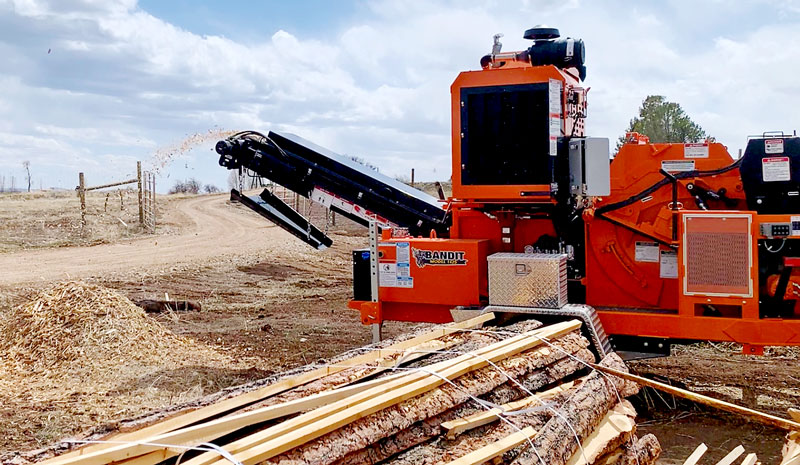
The company uses its mobile grinder to service wildfire mitigation projects, which provides a steady source of wood chips for the composting facility.
DiGiorgio continued working at Local First, and hired a friend who did the curbside collection. Initially, the food scraps were being taken to DiGiorgio’s house, where she would compost them, turning the pile with a shovel. “I put an email out to the universe that I was looking for a site to do the composting, and a couple that owns Savannah Tree Farm, LLC, responded,” she says. “A friend had forwarded them the email. We started composting on a one-acre site on the farm.”
About a year in, with about 300 curbside customers, DiGiorgio was feeling overwhelmed, and decided to find a business partner. She connected with Taylor Hanson, who was co-managing his family’s car dealership in Durango. They formed a 50:50 partnership arrangement. Hanson focused on the business side of Table to Farm Compost while DiGiorgio used her skillset as a grant writer to seek funding to help the company procure needed equipment and permits. She had resigned from Local First in order to focus solely on the composting enterprise.
After being rejected the first time Table To Farm Compost applied to the Colorado Department of Public Health and the Environment’s (CDPHE) Recycling Recovery and Economic Opportunities (RREO) Grants program, the company successfully procured $101,951 in RREO funding to build its compost product line, which included purchase of a Rotochopper Go-Bagger bagging machine. “The second grant from the same source was $187,850, and was for obtaining a Class III permit for our composting site, which we expanded to 4 acres at the same farm. Getting a Class III permit is a complicated process that involves approvals from both La Plata County and CDPHE. It took about two years, but we were successful.”
The Class III permit enables Table to Farm Compost to receive a range of organic waste streams and operate at a larger scale. In addition to source separated household food scraps, the company services grocery stores and other commercial enterprises in Durango and the surrounding area. It also receives beer mash from a local brewery. The facility is permitted to process up to 18,000 cubic yards of material at any one time. Expanding the site enabled the company to switch to a larger scale windrow operation.
Scaling Operations With USDA Grant
Having the Class III permit also positioned Table to Farm Compost to competitively apply for funding from the U.S. Department of Agriculture’s (USDA) Fertilizer Production Expansion Program (FPEP). The company, in partnership with the City of Durango and La Plata County, proposed to scale up production of locally produced compost for the Four Corners [southwest] region of Colorado to “support agricultural production between December 2022 and December 2027 through the Table to Farm Compost FPEP Project (Project),” stated the grant application. “Total Project costs are $4,354,287.60 with $2,607,915.00 requested from the USDA’s FPEP and $1,746,372.60 in matching funds. … We are the perfect candidate for the FPEP because we are on the threshold of expanding our compost production now that permitting and site construction are complete.”
Being “shovel ready” to utilize the funding to expand is a criteria to be able to apply, notes DiGiorgio. The grant application stated that the funds would be used for “the purchase of land, equipment to scale up production, transportation and processing equipment for carbon and nitrogen feedstocks, working capital for expansion, and construction and installation of power. The Table to Farm Compost project would: 1) provide agricultural producers in the Four Corners region of La Plata County (CO), Archuleta County (CO), Montezuma County (CO), San Juan County (NM), and Rio Arriba County (NM) with a local option for compost, 2) increase the domestic availability of compost to agricultural producers for use in crop years 2023, 2024, and 3) reduce the impacts of climate change through the production of food waste compost that reduces greenhouse gas emissions, sequesters carbon, retains water, and supports equality and justice in the Four Corners community.”
In 2023, the company was awarded a $2.6 million FPEP grant from the USDA Rural Development office. It will purchase 5.5 acres from Savannah Tree Farm (which includes the existing acreage where the composting site is located), a windrow turner, a horizontal mobile grinder and a larger capacity rear loader. The FPEP grant also funded bringing power to the site via an interconnection with the electric grid. This enables use of a remote temperature control system and to meet other electricity needs, as well as provides the back-up power required to install solar panels. “Once we had the FPEP funding, we applied for a grant from the Colorado Office of Economic Development and International Trade to install a $500,000 solar panel array,” explains DiGiorgio. “We received the grant, which required a 2:1 match. The FPEP funds provided that match. The solar power is used for general operations and to charge a collection truck that will be electric.”
Current Operations
Table To Farm Compost has about 800 residential curbside collection customers using its 5-gallon bucket service. It accepts all food scraps and soiled paper. Subscriptions are $28/month for weekly collection, and $18/month for every other week. It recently started a kiosk drop-off program for households outside of its curbside service area; a subscription is $22/month. “The furthest kiosk is in Pagosa Springs, which is about 60 miles away,” notes DiGiorgio. “We added that as we have commercial accounts there, and 50 households signed up in two days! But that is the outer limit of our service area.”
Table To Farm Compost is using some of the FPEP funds to purchase a Curbtender Pup rear-loader, enabling the company to expand commercial organics collection. Businesses and institutions receiving service include supermarkets, schools, hotels, restaurants, breweries and government offices. Customers can use 10-gallon buckets or 64-gallon totes.
Truck unloading the beer mash
In addition to food scraps, Table To Farm Compost receives 30,000 lbs of beer mash twice a week from Ska Brewery in Durango, which is about 6 miles from the composting facility. “Ska wrote a grant application to purchase a tanker truck to transport the beer mash to us,” says DiGiorgio. “The grant was submitted to CDPHE’s RREO program and was successful. Having that truck changed everything for both businesses. Beer mash is very wet so the trucks we were using were spilling mash on occasion and we had to make multiple trips a day. Now it’s two to three times/week collection in one sewage truck with no risk of spilling. The beer mash, which makes up roughly half of all food waste received at the facility, is added directly to our mixing pile, and then put into the windrow.“

Compost markets include landscaping, agriculture and nurseries, as well as residents and the Colorado Department of Transportation.
Compost Markets
Residential subscribers receive dividends of two, 7.5-gallon bags of compost a year. Many also purchase compost at a 10% discount. Table To Farm Compost sells finished product at Durango Nursery, and supplies other nurseries around the region with bulk and bagged compost. Other buyers include the Colorado Department of Transportation and landscaping companies.
Thanks to the FPEP, Table To Farm Compost is now in a position to expand sales to the agricultural sector in the Four Corner region. “Many farms that buy our compost sell Community-Supported Agriculture (CSA) shares and have stands at area farmers markets,” explains DiGiorgio. “That sector has really grown, from about 10 farms to 20 farms. Now, we are also able to sell to crop farmers as having more compost enables us to reduce the price point to a competitive amount per cubic yard (cy). We halved the price a few months ago which significantly increased sales.” Currently production is 2,500 to 3,000 cy/year, but the company is projecting that will double or perhaps triple over the next several years.
Wood Chip Sourcing Via Wildfire Mitigation
About two years ago, Table To Farm Compost began running out of the wood chips it uses as a carbon source for the composting operation. “We had windrows of wood chips stockpiled and ran out in two months,” recalls DiGiorgio. “That was a really big problem. I started my career in wildlife conservation and land preservation, so was familiar with forest management and wildfire mitigation. We applied for a Wood Innovation Grant from USDA, and were awarded a couple hundred thousand dollars, which enabled us to hire a forester who helped us develop a plan to offer wildfire mitigation services as a way to procure wood chips. It quadrupled the amount of chips coming in.”
The FPEP grant covered the purchase of a mobile Bandit horizontal grinder and the Wood Innovation Grant covered the transportation costs. “The forester we hired helped us realize two important strategies: target private lands and work within a 60-mile radius,” adds DiGiorgio. “We connect with landowners that conduct wildfire mitigation, such as landscapers, homeowners associations and communities that are seeking a service. Table To Farm Compost bought roll-off containers to transport the wood chips from the sites where we are doing the grinding. We also accept already ground wood chips for free at the composting site.”
This fall, Table to Farm Compost secured a contract with the City of Durango to collect bagged leaves on demand from residences from late September to late November. No fee is charged. The company also has an existing partnership with the city to expand residential and commercial food scraps collection. The initiative was funded, in part, with a CDPHE RREO grant in 2022 to increase awareness about food scraps diversion in the city. Initially, the grant covered a Curbside Compost Market Study that recruited households to participate in the service for free for three months. Households were asked to complete a survey both before and after the service to help understand the reasons for either discontinuing or continuing service for a fee after that timeframe. A wealth of data was collected about perceptions and experiences in composting.
“In short, price and service timeframe were two big factors in households opting to discontinue service,” says DiGiorgio. “As a result, Table to Farm Compost started offering every other week service for a reduced price. This was possible thanks to the company switching its subscription and routing software to StopSuite. The software helped us seamlessly transition our collection service to two subscription types — weekly and every other week. Customers who sign up for either service are automatically placed on the route and then the platform sends email and text message reminders, making every other week service especially convenient. We were able to implement one of the top recommendations of the market study by offering every other week service last April and over 75% of new customers have been choosing this subscription type.”


